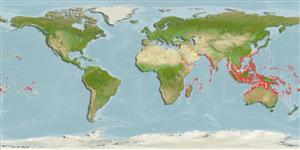Preferred temperature (Ref.
115969): 24.7 - 29, mean 27.8 (based on 1114 cells).
Phylogenetic diversity index (Ref.
82804): PD
50 = 0.5000 [Uniqueness, from 0.5 = low to 2.0 = high].
Bayesian length-weight: a=0.01175 (0.00699 - 0.01974), b=3.19 (3.05 - 3.33), in cm Total Length, based on LWR estimates for this species & (Sub)family-body (Ref.
93245).
Trophic level (Ref.
69278): 4.1 ±0.61 se; based on food items.
Resilienza (Ref.
120179): Medio, tempo minimo di raddoppiamento della popolazione 1.4 - 4.4 anni (Preliminary K or Fecundity.).
Fishing Vulnerability (Ref.
59153): Low vulnerability (15 of 100).
